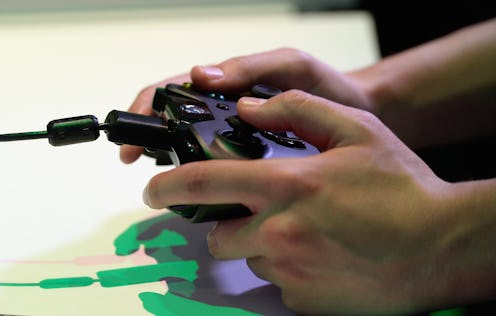News
Playing Too Many Video Games Could Soon Become An Official Mental Disorder

In the immediate aftermath of the Christmas holiday, kids and adults alike will surely have some new video games to play. But an international public health organization would urge you not to go overboard. The World Health Organization (WHO) considers excessive video game playing a mental disorder, or at least that's what's suggested by a new draft of its upcoming International Classification of Diseases. Needless to say, such a declaration could be controversial within the hardcore gaming community.
The draft, which you can read here, doesn't get specific about exactly how much time spent playing video games is too much. Rather, it identifies video games becoming a priority over other life activities or pastimes, and the behavior becoming out of control despite having "negative consequences" for the player.
Gaming disorder is characterized by a pattern of persistent or recurrent gaming behaviour (‘digital gaming’ or ‘video-gaming’), which may be online (i.e., over the internet) or offline, manifested by: 1) impaired control over gaming (e.g., onset, frequency, intensity, duration, termination, context); 2) increasing priority given to gaming to the extent that gaming takes precedence over other life interests and daily activities; and 3) continuation or escalation of gaming despite the occurrence of negative consequences.
The draft classification also states that while the problematic gaming behavior would typically need to be demonstrated over a period of about a year before a diagnosis would be made, it can be even shorter depending on the severity.
"The pattern of gaming behaviour may be continuous or episodic and recurrent," it says. "The gaming behaviour and other features are normally evident over a period of at least 12 months in order for a diagnosis to be assigned, although the required duration may be shortened if all diagnostic requirements are met and symptoms are severe."
This isn't the first time that excessive gaming has been examined as a public health issue, although the WHO's move to declare it a mental disorder is a big step. In 2013, as noted by U.S. News and World Report, the fifth update of the Diagnostic and Statistical Manual of Mental Disorders (DSM-5) identified excessive online gaming as a matter deserving of further study. The WHO's draft, however, draws no apparent distinction between online video games and offline ones.
These sorts of mental health classifications are not without controversy. Back in August, clinical psychologist Dr. Anthony Bean told Polygon he believed the effort to diagnose people with video game addiction wasn't based on sound science, citing the wide range of people who could be accused of such, and the overlooking of other quality of life factors.
"Maybe that person's anxious,” he told Polygon. “Maybe the person's actually depressed and using video games as a coping mechanism, or a mechanism with which to deal with some personal stress in the world. The better questions that we'd be able to ask them is, ‘Are you able to still go to work? Are you paying your bills? Are you still being a productive member of society on some level?'"
Bustle has reached out to the WHO for comment on the ICD 11 beta draft, and will include any response. It's a big deal whenever you're opening up a new group of people or a sort of behavior to potential mental health diagnosis, so it's no surprise that this is getting a lot of attention. Despite once being seen as a niche or fringe activity, video gaming is increasingly popular and prevalent in American life. A Pew study from 2015 found that roughly half of the American public play video games to some extent, although only ten percent consider themselves to be "gamers."